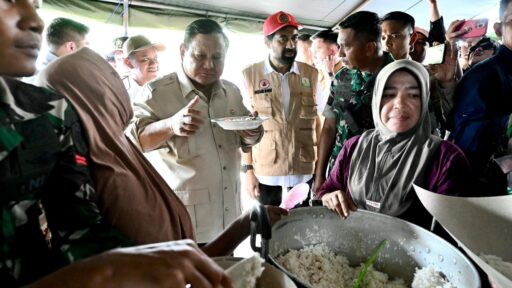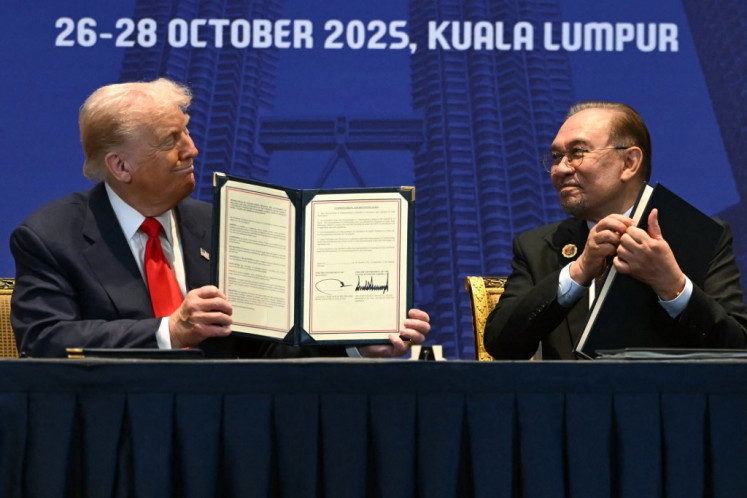Popular Reads
Top Results
Can't find what you're looking for?
View all search resultsPopular Reads
Top Results
Can't find what you're looking for?
View all search resultsNew voice in Indonesian poetry
A young poet that explores homosexuality through his work offers a breath of fresh air to the Indonesian literary scene
Change text size
Gift Premium Articles
to Anyone
A young poet that explores homosexuality through his work offers a breath of fresh air to the Indonesian literary scene.
Norman Erikson Pasaribu, 26, said he was thrilled when he found out that his poetry collection Sergius Mencari Bacchus (Sergius Searches for Bacchus) had won a Jakarta Arts Council poetry manuscript competition last year. The competition was the first to be carried out by the arts council after a long 14-year hiatus.
“The 33 poems were written from early 2015 onward, while I was writing my undergraduate thesis as a student at the State Accounting Academy [STAN],” he said during a recent interview with The Jakarta Post.
Senior poets Joko Pinurbo, Mikael Johani and Oka Rusmini were among the competition judges.
Marking the return of the council’s poetry competition, Mikael said the judge panel had attempted to discover a fresh theme, one that had not been explored in Indonesian poetry before.
“We decided that gay life is a rare theme in Indonesian literature, especially in poetry,” he told the Post during a recent phone interview.
Mikael said that of the 572 entries submitted for the competition, only two contained gay themes, and Norman’s manuscript was one of them.
“Norman’s poems are written in a style that is playful yet reflective and contemplative. The manuscript touches on very current topics and he incorporates pop culture and contemporary lifestyle,” Mikael said, referring to one of Norman’s poems that takes place in the basement of the Sudirman FX shopping center.
Mikael believed that youngsters would be able to relate to Norman’s work through his use of contemporary catchphrases.
Norman is not a new figure in Indonesian literature. His short stories have been published in Indonesia’s leading daily newspaper Kompas and prestigious literary magazine Horison.
In April 2014, he published an anthology of shorts called Hanya Kamu yang Tahu Berapa Lama Lagi Aku Harus Menunggu (Only You Know How Much Longer I Have to Wait) through Gramedia Pustaka Utama.
“That book could set a record for the longest anthology title ever,” Norman said, cheerfully.
In 2015, he was invited to the Ubud Writers and Readers Festival to appear as one of the archipelago’s 15 emerging writers.
Having won the poetry competition, Norman received a subsidy to publish his novel and Gramedia published his poetry collection this year.
Norman’s poems contain a variety of different themes including family life and the isolation of urban life, with references to homosexuality here and there.
The topic of homosexuality is found in the first piece of the anthology entitled Poem, where it is acknowledged that his life is a theatrical act, in a sense that the heterosexual life he leads is just a facade disguising his true homosexual tendencies.
Curriculum Vitae tells the story of a gay man who is publicly scolded as banci (Indonesian slang referring to effeminate men) by his father when he fails to fulfill societal expectations of a “masculine man”.
Pembukuan Berbasis Akrual (Accrual-Based Bookkeeping) is a meditation on life and fate through the principles of bookkeeping, referring to the writer’s background in accounting.
“There were a number of anxieties and questions that I needed to express through poetry. I think references to gay lifestyle is important since there are so many misleading [negative] stereotypes [about the community] because our society remains clueless about what being homosexual truly means,” he commented said.
Norman, who is of Batak Toba descent, said that the 33 poems were the result of his own effort to study Christianity, particularly its stance on homosexuality.
He has been questioning the dogmas presented to him by preachers. Apparently, Sergius and Bacchus are two Catholic martyrs, often venerated by the gay community due to their closeness.
Norman argues that many people in Indonesia remain judgmental about gay people without bothering to learn more about the complexities of sexuality, choosing to swallow what their preachers or parents tell them.
Norman read numerous books in his exploration of the topic.
A History of Christianity written by British scholar Diarmaid MacCulloch was one of the books Norman said he read while attempting to learn about Christianity.
The influence of American poets — whose names he mentions at the back of the poetry book — can also be found in his works and yet he is able to mold them into his own distinctive style. This approach is likened to the creative process taken by Chairil Anwar, one of Indonesia’s greatest poets, who was also inspired by American poets such as WH Auden.
In his poems, Norman quotes lines from American poets Richard Thompson and Richard Siken at the end of his poetry collection. He also mentions Indian poet Vijay Seshadri as a major influence.
Speaking about Chairil, maybe it is not a coincidence that the great poet’s work helped to awaken Norman’s interest in poetry when he was in elementary school.
“I can’t remember exactly when but that was my first introduction to poetry and inspired me to write my own poems. I, however, didn’t write poetry again until I was a 14-year-old senior high school student, and that time was precipitated by a heartbreaking experience,” he said, laughing.
When he pursued his diploma at STAN, he started reading prose written by writers such as Dewi Lestari, Mark Haddon and Gao Xingjian.
“I am quite obsessed by stories written by [Indonesian authors] Eka Kurniawan, Budi Darma, Intan Paramaditha and Linda Christanty. I’ve always mentioned their names [as strong influences] during interviews,” said Norman, who continues to work in finance after obtaining his diploma from STAN.
He is currently working on what he calls his “half-baked” novel, giving it the temporary title Hari Terakhir Keluarga (A Family’s Last Day).
“Writing this novel exasperates me,” he said.










